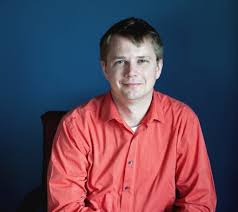Too many audio books over the past few months sit undigested in my soul like a few too many rich meals in quick succession. In March of 2019, I was still walking to work with a friend for about fifteen minutes on most mornings. It was downhill along Newberry Street through York, PA to a school beside the Codorus Creek where we worked together and where both of us had children attending. My children still attend there, and I still live on Newbery. However, I have since replaced this morning routine with a 35 to 60 minute commute depending on the time of day. I went from walking with a friend to being carried alone at high speeds in a box of steel and glass, powered by the concentrated combustion of fossil fuels along roadways of concrete and asphalt. These days, long portions of new audiobooks have replaced 15 to 20 minutes of meandering conversations as the immediate framework for my work-day. I knew from the start that this aspect of my move was a step in the wrong direction, and I hope eventually to bring the pieces of my life back into a greater harmony.
One of the books to which I listened recently was The Desert Fathers by Benedicta Ward. It was not available as an audiobook, but Siri has grown steadily better over the years at reading out loud to me from the Kindle app on my phone. I listened to more than half of the sayings and stories two or three times, having Siri backup frequently to re-read large portions that had mystified or astounded me. As an educator moved specifically into curriculum publishing, I noticed with some chagrin that these sayings had almost nothing positive to say about reading books. A few philosophers and scholars found a place among the ranks of the desert mothers and fathers, but the majority of these early monastics were illiterate. For those with an education, it was rarely an advantage and sometimes a clear hindrance. All of the fathers and mothers had a firm grip on the Christian scriptures through oral culture, but the written word was unequivocally suspect. One motif that got my particular attention was a warning against accumulating “books on your windowsill.” Within Ward’s collection, this image showed up in three different sayings:
- Three brothers once came to a hermit in Scetis. …The second said to him, ‘I have written out the Old and New Testaments with my own hand.’ But the hermit said, ‘And you have filled the window-ledge with manuscripts.’
- A hermit said, ‘The prophets wrote books. Our predecessors came after them, and worked hard at them, and then their successors memorized them. But this generation copies them onto papyrus and parchment and leaves them unused on the window-ledge.’
- A brother said to Serapion, ‘Give me a word.’ But he replied, ‘What can I say to you? You have taken what belongs to widows and orphans and put it on your window-ledge.’ He saw that the window-ledge was full of books.
These Christian monastic pioneers saw that books left on the windowsill are more likely to make an impression on those outside than on those within. Such insistence upon this point gives me pause as someone who has piled countless surfaces with books since my childhood. What matters are the words that break open deep within our warm and living hearts to push up and bear fruit. Conversely, stories and words offer to take us into themselves so that we find who we are only as we find ourselves within them. Either way, the alphabet is a threat because it is so uniquely capable of leaving language silent, untended, and uselessly multiplied upon the page.
Language, properly apprehended, cannot be inert. Elena Shvarts’ poem “The Book on the Windowsill” communicates this as fiercely as anything that I’ve been given:
A mighty tree is the word of God,
A laurel with leaves that whisper and rustle;
The prophets hang on it like thorn-apples, . . .
I cannot approach the tree in its thickets;
Yet you’re there in the heart-wood, the smouldering trunk. . . .
The hollows hold luminous spirits, . . .
They say you can’t read every word. If you do, you go mad.
It seems to be true: I can feel that my own mind is shaking.
Reason’s as ready to burst as an over-ripe pumpkin,
Just as the smug, stout-walled town of Jericho learnt.
This contemporary poet, translated from Russian, clearly understood the desert dwellers to whom she so modestly alludes within her title. With them, she condemns our abandonment of words to the wasteland of books—to the dry pages stacked impressively between us and the world.
These mothers and fathers of the desert prized the realities of our internal life over any external appearances, and they put actions before words. Although their sayings censored both oral and written language, the written word earns the most relentless critique. Their almost entire dismissal of books is not indicative of Christian culture at large during this same period. Many great defenders of the desert monks and collectors of their sayings were profoundly learned Christian scholars such as Athanasius who wrote volumes and who had fully incorporated the long and distinguished heritage of Hellenistic learning into their schools of Christian theology.
However, it would also be a gross misunderstanding of these humble monks to think of their rejection of books as an anti-intellectual bias among a particularly fanatical Christian community. At the roots of the leading pagan philosophical schools, this same concern for written language was explicitly expressed. Socrates says in Plato’s Phaedrus that mastery of the alphabet will “introduce forgetfulness into the soul of those who learn it … because they will put their trust in writing, which is external and depends on signs that belong to others, instead of trying to remember from the inside, completely on their own.” These eager new readers and writers “will imagine that they have come to know much while for the most part they will know nothing.” The ability to read and write a great volume of words traps us in a profound illusion of knowledge and wisdom that leaves us confident in our mastery of the truth and less aware of the limits of our knowledge. This is exactly what the monks of the Egyptian desert warned against. Socrates concludes by saying that those who learn to use an alphabet “will be difficult to get along with, since they will merely appear to be wise instead of really being so.”
Written language not only fails the reader, but Socrates goes on to describe how it fails the writer:
When it has once been written down, every discourse roams about everywhere, reaching indiscriminately those with understanding no less than those who have no business with it, and it doesn’t know to whom it should speak and to whom it should not. And when it is faulted and attacked unfairly, it always needs its father’s support; alone, it can neither defend itself nor come to its own support.
[On the other hand,] a discourse that is written down, with knowledge, in the soul of the listener …can defend itself, and it knows for whom it should speak and for whom it should remain silent.
Our written words sit defenseless in the face of both callous indifference and terrible ignorance. Moreover, words on a page cannot be incorporated together with other essential aspects of human culture (such as festal seasons, sustained periods of apprenticeship, songs, dance or visual imagery). Only when words are enmeshed within human culture in these kinds of ways can they carry truth and wisdom in their fullest forms.
Still, I have not gotten at the core reality to which books do violence across time. The songs of minstrels or the words of poets and sages are only beautiful and true in so far as they show us what is real—both within ourselves and in the world that we share. What matters is not the beauty or truth of the artistic or scholarly language itself. Faithful language is beautiful and true only when it opens our hearts and eyes to the realities to which we are blind. When we think that the correct arrangement of words or ideas is all that matters, then we can accomplish this by arranging the words and ideas correctly upon a few pages and filing these pages away properly within their respective places. Reality, however, confronts us continually as a gift that we cannot take up or fully apprehend. Language provides a living interface between the two realms that surround each of us without and within (i.e. the cosmos and its microcosm within each human person). Putting language onto a page threatens to deprive us of words that are alive and responsive, within our hearts, to as much as possible of this continual gift.
Literacy rates have climbed worldwide at astonishing rates since the invention of the printing press. Placing these numbers on to graphs produces images that are euphoric in their sweeping upward climbs toward 100% global literacy. Reinforcing these images, we can also easily chart the remarkable duplication of written directions that have allowed the most effective means of modeling nature and then of controlling our environment and of producing material wealth to be endlessly refined as well as to be adopted or imposed worldwide (i.e. the growth of science and technology). Likewise, we could illustrate the astounding availability of great works of literature, art, and music as well as the ability to share any songs or stories of that might capture the attention of as many people as possible in the shortest possible elapse of time (i.e. the growth of mass media). (For a thought-provoking look at contemporary concerns developing with regard to current forms of mass media, see Stand out of our Light: Freedom and Resistance in the Attention Economy by James Williams.)
What we don’t see, however, are the many ways in which our abilities to perceive reality have deteriorated over this same period of time. As a teacher, I came slowly to realize that my students and I were all missing critical capacities that so many of the people in our books took for granted. When had any of us ever run our hounds along the river bottom through long hours of the night in pursuit of coons? When did ancient family allegiances or rivalries ever call upon us to agonize or sacrifice? When had we ever waited in silence for more than ten minutes before turning toward our phones? When did we ever face real hunger or eat an entire meal made of foods that we had watched growing for months in the fields or gardens around our homes? When did we ever have to stand aside with eyes lowered to the pavement as our queen passed by high overhead? When had most of us last seen a sunrise or watched the stars fill the sky? When had any of us heard a short burst of bird song and recognized the arrival of the ideal season for planting one particular type of seed? Fundamental elements of human formation that have been essential across our entire history—such as the mastery of basic handcrafts, the experience of hardship and silence, or the awareness of predictability across generations—are all almost completely absent in our lives today.
Robert Macfarlane makes some of these points in his book Landmarks:
The terrain beyond the city fringe has become progressively more understood in terms of large generic units (‘field’, ‘hill’, ‘valley’, ‘wood’). It has become a blandscape. We are blasé about place, in the sense that Georg Simmel used that word in his 1903 essay “The Metropolis and Mental Life”—meaning indifferent to the distinction between things. It is not, on the whole, that natural phenomena and entities themselves are disappearing; rather that there are fewer people able to name them, and that once they go unnamed they go to some degree unseen. Language deficit leads to attention deficit. As we further deplete our ability to name, describe and figure particular aspects of our places, our competence for understanding and imagining possible relationships with non-human nature is correspondingly depleted. The ethno-linguist K. David Harrison bleakly declares that language death means the loss of “long-cultivated knowledge that has guided human—environment interaction for millennia …accumulated wisdom and observations of generations of people about the natural world, plants, animals, weather, soil. The loss [is] incalculable, the knowledge mostly unrecoverable.”
It is tempting to try representing a variety of such losses on charts and graphs. Alongside our much more visible progress in recent centuries, we somehow need to start visualizing the losses and regressions in our perceptual capacities and therefore in the depth of our daily experiences. However, these losses in our perception and in the quality of our lives are difficult to quantify and virtually invisible to us once they are lost. One approach to raising our consciousness regarding these losses might be to consider the connections between the cultural dominance of the written word and two types of inhumanity in the modern period: 1) the massive death tolls that can be straightforwardly attributed to the rise of the secular nation-state and 2) the more hidden brutality of applying large-scale and mechanized management processes to almost every stage of human life: childbirth, education, labor, sickness, disability and aging. Making such extended connections, however, carries us too far from our subject.
My core concern is that we are increasingly blind to (as well as distracted from) the love of God along with the beauty and glory of all that God gives to us moment-by-moment. Over time, humans are losing our ability to read reality in an inverse proportion to our improved ability to read books. I know at a personal level that this problem is intensely difficult to point out to book readers because book readers are profoundly insulated from the fact that they are increasingly incapable of perceiving what exists. However, consider that an increasing number of us will grant that digital media is actively distorting our ability to read reality. Now, allow that the roots of these same distortions might extend even further back into the disruption of oral cultures that took place with the invention of the alphabet.
By reality, I mean Lady Nature as we meet her in Wendell Berry’s essay “The Presence of Nature in the Natural World,” but even beyond her I mean the ground of all being from which she arises and of which she speaks. Lady Nature discourses continually of our Creator who gives each moment to us (with all that each moment holds—both perceived and unperceived). With these poor words on a screen, however, I’m quickly exposing my own feeble grasp of language and my own inadequate storehouse of images and stories.
Perhaps another saying from the desert that troubles me will help us here. This blunt, one-line anecdote is from a desert mother: “They said of Sarah of blessed memory that for sixty years she lived on the bank of a river and never looked at the water.” Not content to pillage my stash of books, these desert fathers and mothers are also ready to rob me of the book of nature. Will they carry off “the peace of wild things?” Reading of Amma Sarah’s sixty years without looking upon the lovely waters of the Nile, my mind’s eye went to Annie Dillard writing Pilgrim at Tinker Creek: “I come down to the water to cool my eyes. But everywhere I look I see fire; that which isn’t flint is tinder, and the whole world sparks and flames.” Elsewhere, looking up from the creek, Dillard “saw in a blue haze all the world poured flat and pale between the mountains.” This student of Thoreau and Emerson could easily be read in stark contrast with Amma Sarah and her desert brothers. She even speaks of books communing with her from their shelves:
It has always been a happy thought to me that the creek runs on all night, new every minute, whether I wish it or know it or care, as a closed book on a shelf continues to whisper to itself its own inexhaustible tale. So many things have been shown so to me on these banks, so much light has illumined me by reflection here where the water comes down, that I can hardly believe that this grace never flags.
While the contrasts between Amma Sarah (who left us no account of her river) and Annie Dillard (who so carefully chronicled her visits to her creek) can be fruitful in their own place, the sisterhood of these two women is far more basic and profound. What but a profound love of its rolling waters can have compelled Sarah to have refrained for sixty years from looking upon the nearby Nile? So they are not so different, and we should give heed to each in her place. One pauses at the edge of suburbia to consider the fire and the blue haze of reality at the side of Tinker Creek. The other, just over a millennia before, hands her love of the Nile River over to her Creator as a silent thanks that will heighten her own delight and also stir up the hearts of her disciples for centuries to come.
To hear a book is to stand before it as a source of fire and food—a source recognized as revealing a reality that swallows us up but also a reality reflected deep within us where the words of the book can take root and yield fruit. In this reading, human language, human artifice, and the speeches of Lady Nature will all harmonize in their revelation of their common Source. This reading of reality requires cultivation and attention, which requires, in turn, moderation and selection. This reading is also multiplied by shared experience–for instance, reading out loud with others in a slow encounter.
With all my myriad of blogs and books that Siri can read to me, my many music apps, my podcasts, and my audio books narrated by masterful readers, my options are nonetheless severely limited each morning as I rattle down the highway in my car. My list of options is limitless in comparison to my actual capacities to listen, but this list is nonetheless impoverished in comparison to the simple goodness of 15 minutes conversing with a wise and loving friend.
When Augustine first encountered Ambrose reading out loud to himself, Augustine had to watch carefully to understand what he was seeing. Clearly, Augustine had never before encountered someone reading silently, and he had some trouble even conceptualizing it (Confessions 6.3). At the time, Augustine was educated in the best schools on two continents and was serving as the leading professor of rhetoric in the court of the Roman emperor. Ironically, Ambrose, the great musician, seems to have invented silent reading. For most of human history, language was intimately connected to the physical (and typically shared) experience of sound. We on the far side of the printing press (and only just a little past the internet) need to intentionally recall that the written alphabet is a strange abstraction that is potentially deadening, isolating, and deeply deceptive in its promise of accumulated wisdom.
Thankfully, the means that we have to combat these ailments are simple and timeless. Use your memory (that almost forgotten canon of rhetoric). Use your voice. Keep the realms of your life (family, work, worship, and learning) as simple and integrated as you can manage in these sadly fractured times. Stay put in the same place as much as you are able, and frequent places such as firesides and porches. Request and bring out stories, poems, and songs (in moderation) when you are dining or drinking with others. And guard your poor heart against the allure of those books that might accumulate on flat surfaces and obstruct the sun.






5 comments
Dan Grubbs
I have friends who unwittingly collect lots and lots of books. They read them once or maybe twice and up on a shelf they go to set for decades. I ask, “Why don’t you donate them to a library or charity?” I usually hear some type of reply close to, “Oh, I could never part with my books.” I think I understand this, but I wish those folks would understand my point of view. Books are meant to be read. And I strongly believe the written word sitting on a shelf delivers no value to the world. Give books away. Get them in people’s hands. Spread the knowledge or story of those books to more people. I am convinced that we would be a better society if more people read more. Now, I understand some of the trepidation of giving away meaningful volumes. When I gave away my Riverside Chaucer and Riverside Shakespeare compilations, I felt a pang. No doubt. But, when I think of what those volumes did for me, I had pass them on with the hope that they would impact the recipient in the same way. My personal library is no larger than maybe 20 volumes. I don’t think that’s a point of good or bad. But, I think I have had a hand in the spread of important ideas. Maybe those ideas might not have spread into my sphere of influence if I kept them on a shelf. Just my thoughts on this.
Jesse Hake
I’ve only given away a very few beloved books, but there is a special joy in it. Thank you for sharing.
Daithi Dubh
Thanks for this essay!
It calls to mind an anecdote (I don’t remember precisely where I read it) about, of all people, Daniel Boone, as he was on one of his many journeys through this part of the Southeast, toting a copy of, say, Gulliver’s Travels, and taking some time perhaps beside a newly discovered spot on a creek bank to read a chapter or two.
Printed words, the world of the mind, yet necessarily grounded and remaining in Reality.
When I think of the virtually endless quantities of (mere) information we are exposed to daily and contrast that to what our forebears, like Boone, had to deal with, I come away valuing their thoughts and observations far more. For all the limits of information they had, they had to live in Reality, and not merely inhabit some Abstractia as we increasingly do. When they thought – and Lord knows, they had the time to think . . . and discuss! – their thoughts were grounded in the world as it is!
Jesse Hake
Thank you for encouragement and the anecdote. And I may borrow this some time: “They had to live in Reality and not merely inhabit some Abstractia.”
Daithi Dubh
You’re most welcome, sir! God’s blessings and a merry Christmas to you and yours!
Comments are closed.